Former State Representative Will Dismukes to be sentenced today
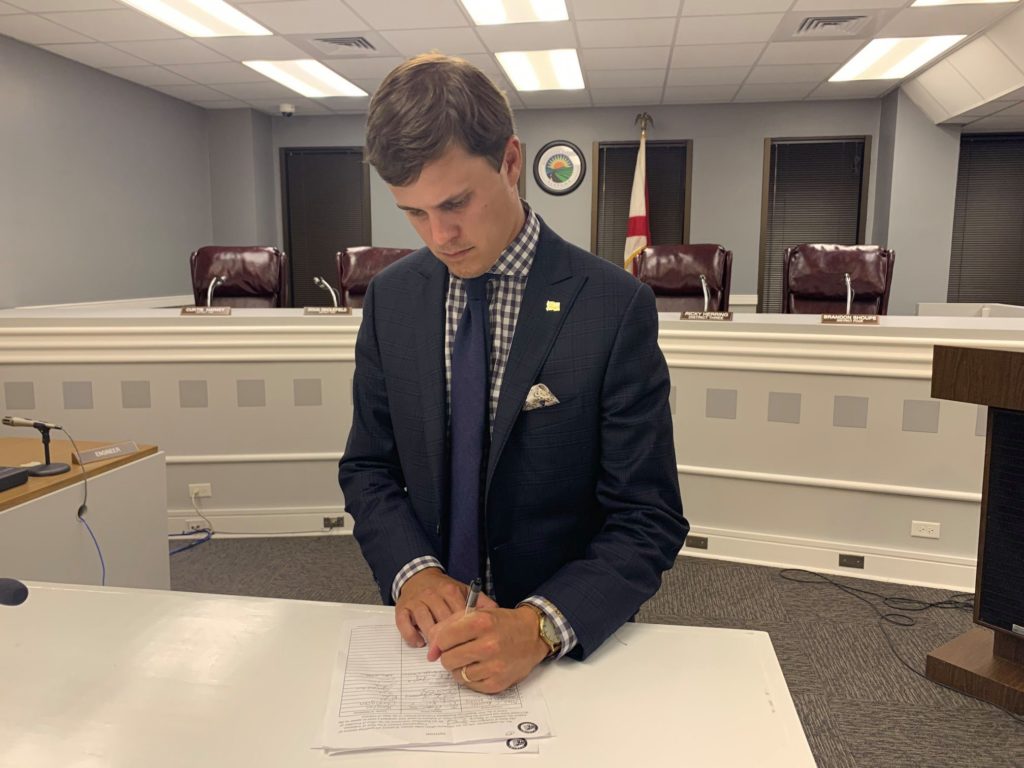
Former State Representative Will Dismukes is scheduled to be sentenced on Monday, July 17, on theft charges. The Prattville Republican was convicted on a first-degree theft of property charge. The jury also found Dismukes guilty of two aggravating factors, which will permit Judge Brooke Reid to sentence the former lawmaker to prison. Dismukes’ sentencing was scheduled for May 4 but was moved to July 17 after Dismukes’ father committed suicide in the aftermath of his son’s conviction. Dismukes was found guilty by a Montgomery County jury of stealing thousands of dollars from his former employer, Weiss Commercial Flooring. Prosecutors accused Dismukes of working for Weiss and then taking money, tools, and materials belonging to Weiss in order to start his own custom flooring company. None of the charges against Dismukes were related to public corruption or his tenure representing House District 88 in the Alabama House of Representatives. “I am very pleased with the jury’s conviction in this case,” said District Attorney Darrell Bailey. “Dismukes thievery cost a local business thousands of dollars in stolen revenue. This is the first time in history that a Montgomery jury has found an aggravator in a theft case. Because of this, my office will be seeking significant prison time for Mr. Dismukes.” Dismukes has steadfastly maintained his innocence and has vowed to appeal the conviction. Dismukes was a pastor and businessman in Prattville when he was elected to the Alabama House of Representatives in 2018. The young legislator appeared to be one of the Alabama Republican Party’s rising stars. He even announced that he was running for Congress in Alabama’s Second Congressional District before ultimately dropping out of the race and endorsing GOP rival Jessica Taylor. Dismukes drew statewide criticism for speaking at a birthday celebration in Selma for Confederate General Nathan Bedford Forest while former Congressman John Lewis’s body was lying-in-state in his native Selma. The Forest birthday celebration is an annual event in Selma and was scheduled before Congressman Lewis passed. Forest, who became wealthy as a slave trader before the Civil War and his rise to Confederate general, is believed by most historians to have become the first head of the Ku Klux Klan during the turbulent Reconstruction years following the Civil War. Dismukes was the Chaplain for his local Sons of Confederate Veterans chapter. The event and Dismukes’ participation in it likely would have gone unnoticed, except Dismukes posted about it on his social media. Under the circumstances, most observers statewide and nationally felt that the Forest birthday event should not have been held that year. Both Democrats and some Republicans called on Dismukes to resign from the Legislature. Dismukes was forced to resign as pastor at his church after the Forest scandal. Following the Forest controversy, it was announced that there was an investigation into Dismukes’ alleged theft from Weiss. Dismukes was indicted before the 2022 election. Despite this, Dismukes ran for re-election in 2022 but lost the Republican primary to Jerry Starnes 62 to 38%. Starnes subsequently won the general election. To connect with the author of this story or to comment, email brandonmreporter@gmail.com.
Terri Sewell hosts symposium on Shelby v. Holder
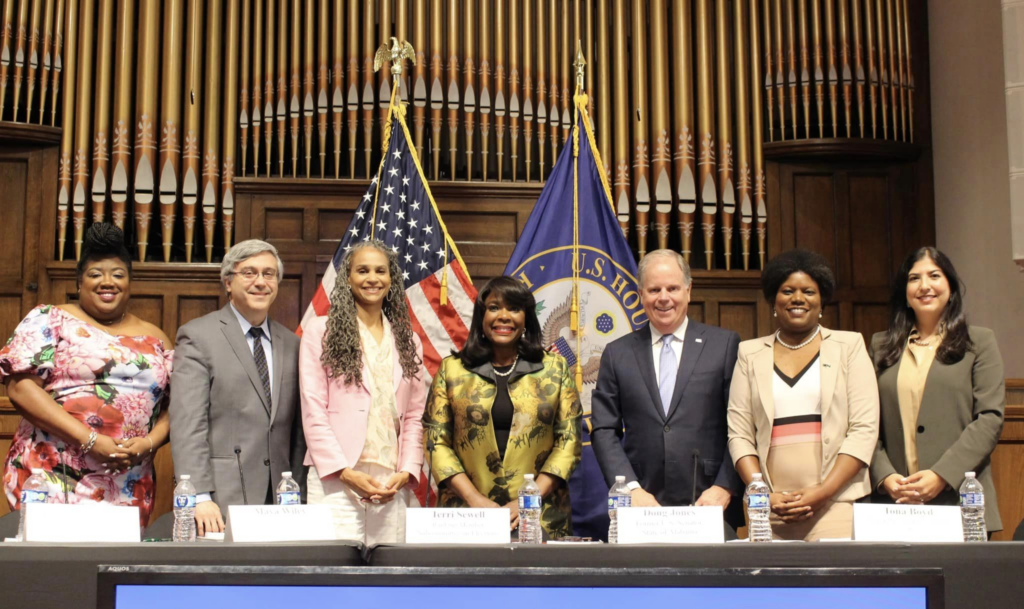
On Wednesday, Congresswoman Terri Sewell (D-AL07) led a symposium in Birmingham on the landmark Supreme Court ruling Shelby v. Holder that struck down the preclearance section of the Voting Rights Act 1965. “This morning, I convened some of our nation’s premiere civil rights and voting rights leaders at the 16th Street Baptist Church to commemorate the 10th anniversary of the Shelby County v. Holder decision which gutted the Voting Rights Act,” said Sewell on Facebook. “In the decade since the Shelby decision, one thing is clear—old battles have become new again as the right to vote has come under attack. But we in Alabama have seen this before and we’re not going down without a fight. The Foot Soldiers left us a blueprint to protect their progress and advance it. Drawing courage from their sacrifice, we will protect the right to vote in Alabama and across the country.” Sewell was joined on Wednesday by President & CEO of The Leadership Conference on Civil and Human Rights Maya Wiley, former U.S. Senator Doug Jones, the President & General Counsel of the Mexican Americans Legal Defense Fund (MALDEF) Thomas A. Saenz, the Associate Director-Counsel, NAACP Legal Defense Fund (LDF) Tona Boyd, Staff Attorney, Native American Rights Fund (NARF) Jacqueline De Leon, Birmingham Civil Rights Institute President & CEO DeJuana Thompson, the executive director of Alabama Forward Evan Milligan, the Co-Founder & Executive Director of Black Voters Matter Cliff Albright, the Vice President of Census & Voting Programs for Asian Americans Advancing Justice (AAJC) Terry A. Minnis, the Co-Director of the Voting Rights Project for Lawyers’ Committee for Civil Rights Under Law Marcia Johnson, and the Alabama Policy Director for the Southern Poverty Law Center Jerome Dees. “The Shelby decision was decided in 2013,” Sewell said. “It had tremendous ramifications. The disastrous decision in Shelby versus Holder gutted key provisions of the Voting Rights Act of 1965,” Sewell said. “The preclearance section stopped really restrictive voting laws before they went into effect.” “The Leadership Council on Civil and Human Rights is the lobbying arm of the civil rights movement,” President Wiley said. “Barack Obama won in 2008, and that was the beginning of the end of bipartisanship on voting rights.” “In 2006, George Bush supported, and very few members of Congress were willing to oppose, extending the Voting Rights Act,” Wiley said. “After Obama’s win, things changed. Instead of contesting for our votes, they made it harder for us to vote,” Wiley said. Sen. Jones said, “Terri has become, since the death of John Lewis, the champion of voting rights in the U.S. Congress.” Jones said that in the effort to make it harder to vote, “we (the state of Alabama) have kind of led the way.” Jones said that Alabama has a “very restrictive voting law.” “Alabama has done a good job of registering people, but we have made it very difficult to vote,” Jones said. “Our voting is still below the national average, even in Georgia.” “Racial turnout gaps have increased in Alabama over the last ten years,” Sewell said. “I am proud to be the lead sponsor of the John Robert Lewis Voter Protection Act. Restoring preclearance is the key to unlocking a lot of the voting suppression laws that we have.” Saenz said the Shelby v. Holder ruling gave “a green light to further restrict people of color, blacks, and Latinos.” “But for Shelby County, Texas would be a swing state today,” Saenz said. “The Voting Rights Act was the most effective federal civil rights law in United States history.” Since Shelby County v. Holder, Saenz said it is much more difficult for MALDEF to be aware of voting process changes, especially at the local level. “A pronounced lack of transparency in what is happening at local levels across this country to suppress minority voters across this country,” Saenz said. “We don’t know about some of these changes until it is too late to go into court to do something.” “There are five states where the Black population is rising faster than the Hispanic population, and Alabama is one of those states,” Jones said. “20% of the Black population is under the age of 20. Times are a changing, and the people on the other side know it.” Jones said that nonpartisan committees for redistricting congressional seats and legislatures is a change that is needed. “Congress needs to pass some minimal standards for early voting,” Jones said. To connect with the author of this story or to comment, email brandonmreporter@gmail.com.
Democratic leadership address the Supreme Court rejection of Alabama’s congressional redistricting
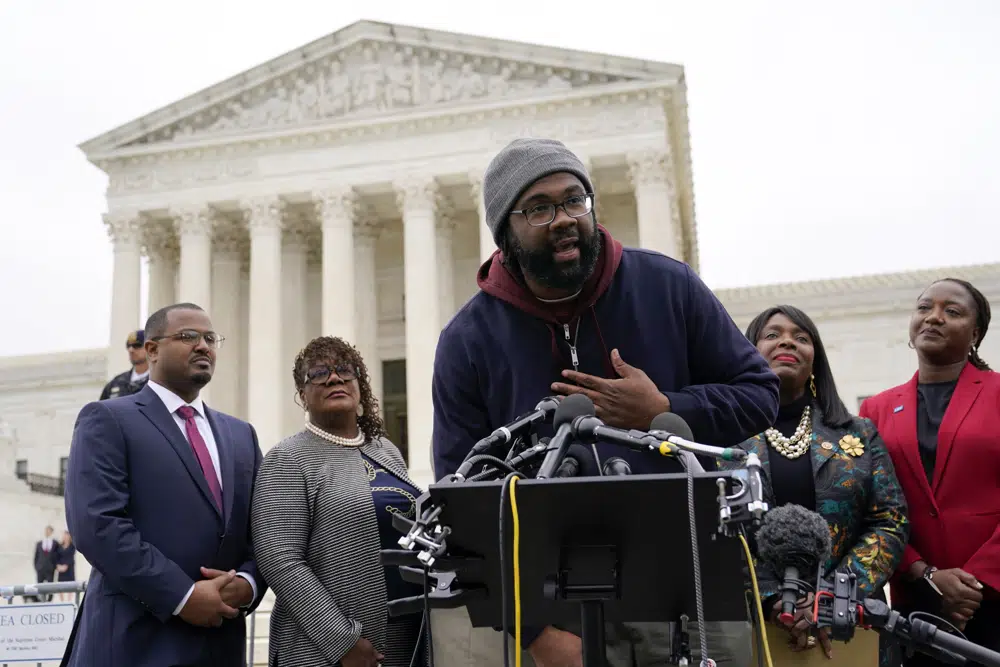
On Thursday, the United States Supreme Court ruled that Alabama must redraw the state’s congressional map to allow an additional Black majority district to account for the fact that the state is 27% Black. The Alabama House Democratic Caucus and the Alabama Legislative Black Caucus both applauded the ruling. Alabama House Minority Leader Anthony Daniels (D-Huntsville) said, “During a severely short and limited map-drawing process, our Caucus spoke at length about our view of the law and provided ways the state could craft at least two districts that reflect fair political opportunities for African American voters.” “We are therefore pleased that the Supreme Court affirmed the decision of the unanimous district court, which found the Alabama maps were discriminatory,” Daniels continued. “We stand ready to participate meaningfully with our colleagues to create a new map that fully complies with the law.” Rep. Terri Sewell wrote on Twitter, “Wow!!! The Supreme Court just upheld Section 2 of Voting Rights Act of 1965 and protected the voices of Black and minority voters. This is a historic victory not only for Black voters in Alabama, but for Democracy itself.” In a press release, Sewell said, “This is a historic victory, not only for Black voters in Alabama, but for Democracy itself. With this decision, the Supreme Court is saying loudly and clearly that the voices of minority voters matter and that fair representation must be upheld. I know that John Lewis and the Foot Soldiers of the Voting Rights Movement are smiling as they look down on us. Today, their sacrifice was rewarded. Our work is not over. We must continue the fight for fair representation by passing the John R. Lewis Voting Rights Advancement Act to restore the full protections of the Voting Rights Act of 1965.” State Senator Merika Coleman (D-Birmingham) is the Chair of the Alabama Legislative Black Caucus. “From the beginning of this case, we have strongly denounced racial gerrymandering and will continue our efforts to ensure that districts are drawn equitably and fairly,” said Sen. Coleman. “I applaud Chief Justice (John) Roberts for preserving Section 2 of the Voting Rights Act. This is a major victory for Black voters in Alabama, as well as the entire nation.” State Representative Napoleon Bracy, Jr. (D-Prichard) is the Vice Chair of the Alabama Black Legislative Caucus. “In a resounding victory for fair representation, the Supreme Court’s unexpected decision stands as a powerful testament to the importance of upholding the Voting Rights Act,” Rep. Bracy said. “By prohibiting racial gerrymandering in Alabama, the Court reaffirms the principle that every citizen’s voice deserves to be heard, regardless of their race. This ruling sends a clear message that political power should not be diluted through discriminatory practices, ensuring that the spirit of democracy remains strong and inclusive in Alabama.” In 2021, the Alabama state legislature produced new congressional maps which closely paralleled the previous 2012 redistricting with just one Black majority district. In a narrow 5-4 decision, the majority of the Court sided with the plaintiffs and affirmed that Section 2 of the Voting Rights Act requires the Alabama legislature to draw a second district where minority voters can elect a candidate of their choice. The decision will also have an impact across the South, as today’s decision clears the way for additional minority districts to be drawn in other states with challenged maps, like Georgia and Louisiana. “It is hard to imagine many more fundamental ‘prerequisites’ to voting than determining where to cast your ballot or who you are eligible to vote for,” Chief Justice John Roberts wrote. The 34-page decision in Milligan penned by Roberts recommits to the Voting Rights Act’s promise as the foundation for justice for all, not just some. Roberts was joined by Justices Sonia Sotomayor, Elena Kagan, Kentaji Brown Jackson, and Brett Kavanaugh. Jeff Loperfido is the Interim Chief Counsel for Voting Rights at the Southern Coalition for Social Justice. “This is a great day for democracy and for the voting rights of Black and Brown communities throughout the South who continue to be the targets of discriminatory laws that seek to silence their voices and stifle their growing political power,” said Loperfido. “The Court’s forceful repudiation of Alabama’s extreme and disingenuous ‘race-blind’ mapping theory is a testament to the important role the Voting Rights Act plays in rooting out discriminatory electoral practices.” The Legal Defense Fund (LDF), American Civil Liberties Union, ACLU of Alabama, Hogan Lovells LLP, and Wiggins, Childs, Pantazis, Fisher & Goldfarb brought the case in November 2021 on behalf of Evan Milligan, Khadidah Stone, Letetia Jackson, Shalela Dowdy, Greater Birmingham Ministries, and the Alabama State Conference of the NAACP. It was argued before the Court on Oct. 4, 2022. The case goes back to the three-judge panel of the Eleventh Circuit Court of Appeals in Atlanta that originally ruled against the State of Alabama. The Supreme Court had stayed its ruling last year at the request of Alabama Governor Kay Ivey, Alabama Attorney General Steve Marshall, and then-Secretary of State John Merrill. The three-judge panel will decide whether to order the Legislature to redraw the districts following the orders of the Court or order the state to adopt a zoning map drawn by the courts. Two alternative maps were presented to the Court by the plaintiffs. The easiest thing would be for the three judges to order the state to accept one of those maps. Whatever happens, Alabama’s Congressional maps will look substantially different than they are today by the end of the year. This will likely impact hundreds of thousands of Alabama voters. The major party primaries for the congressional districts will be on March 6. To connect with the author of this story or to comment, email brandonmreporter@gmail.com.
Former State Representative Will Dismukes convicted on theft charges

On Friday, a Montgomery County jury found former Alabama state Representative Will Dismukes guilty of first-degree theft of property charges. The jury found former Rep. Dismukes guilty of stealing from his former employer, Weiss Commercial Flooring. Dismukes was also found guilty of two aggravating factors, which could lead the first-time offender to spend time in prison when sentenced. “I am very pleased with the jury’s conviction in this case,” Montgomery DA Daryl Bailey told reporters. Dismukes thievery cost a local business thousands of dollars in stolen revenue. This is the first time in history that a Montgomery jury has found an aggravator in a theft case. Because of this, my office will be seeking significant prison time for Mr. Dismukes,” Bailey said. Dismukes, a Republican, represented Elmore and Autauga Counties in the Alabama House of Representatives from 2018 to 2022. Dismukes lost his bid for re-election in the 2022 Republican primary to Jerry Starnes. Dismukes broke away from Wiess Commercial Flooring and started his own flooring business. The accusations against Dismukes were leveled by his former employers. Dismukes was indicted by a Montgomery grand jury in June 2021. Dismukes was a pastor of a Prattville Church but resigned after he was criticized for attending a birthday celebration in Selma for Confederate General Nathan Bedford Forest while former Congressman John Lewis’s (D-Selma) body was lying-in-state in his native Selma. Forest, who became wealthy as a slave trader, headed the Ku Klux Klan following the Civil War. Dismukes was the Chaplain for his local Sons of Confederate Veterans chapter. Dismukes, although one of the youngest members of the Legislature at the time, once collapsed on the floor of the House during his tenure in the body. Dismukes was a 2020 Republican candidate for Congress in Alabama’s Second Congressional District but dropped out of the race and endorsed Jessica Taylor. He also endorsed John Merrill for U.S. Senate. Merrill dropped out of the Senate race when Jeff Sessions entered the 2020 GOP primary field, while Taylor finished third in the GOP primary for Congress. Prosecutors claimed that Dismukes stole thousands of dollars in building materials and tools from Weiss and cashed checks that should have gone to his then-employer. Dismukes testified in his own defense in his trial saying that he did not steal but rather said that he “double-dipped.” Montgomery Judge Brooke Reid will hold a sentencing hearing for Dismukes on May 4th, 2023. To connect with the author of this story or to comment, email brandonmreporter@gmail.com.
Terri Sewell says that voting rights struggle continues today
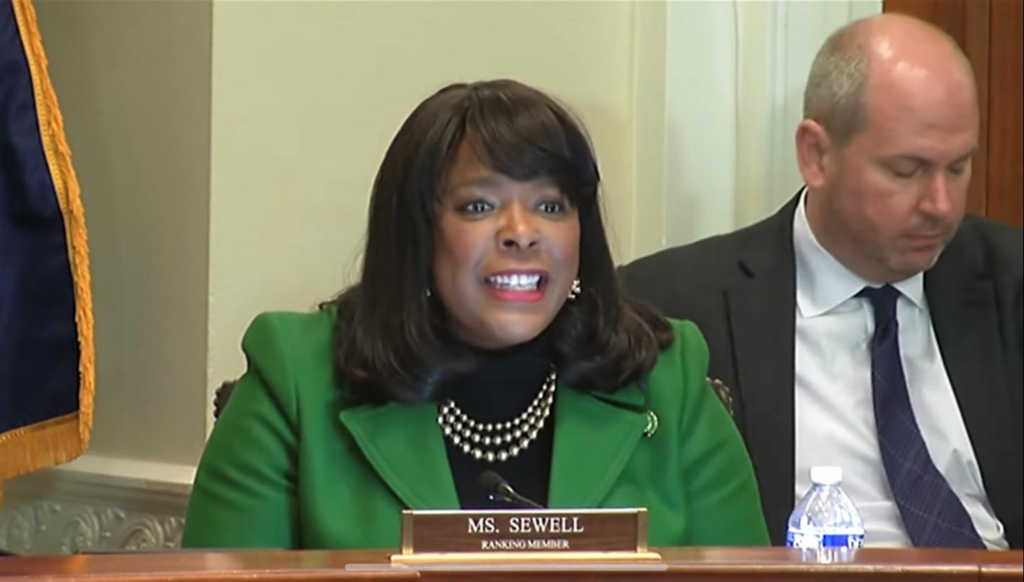
Congresswoman Terri Sewell said that the voting rights struggle continues today. Sewell made her comments during a hearing of the Committee on House Administration Subcommittee on Elections, where she is the Ranking member. As Ranking Member, Sewell serves as the highest-ranking Democrat on the Subcommittee, which has jurisdiction over the administration of federal elections. “Providing oversight over federal election administration and ensuring every American has free and equitable access to the ballot is vital to our democracy,” Sewell said. “I represent Alabama’s Seventh Congressional District, a district with a long, storied history in this country’s struggle for free and fair access to the ballot. I am excited to join this Committee and continue this critical work.” “Last weekend, we marked the 58th anniversary of Bloody Sunday in my hometown of Selma with President [Joe] Biden, a bipartisan delegation of Members of Congress, civil rights leaders, and many of the surviving Foot Soldiers of the March from Selma to Montgomery,” Sewell said. “This annual pilgrimage serves as a reminder that the violent struggle for voting rights and equal access to the ballot is not one of the distant past. As we sit here today discussing the 2022 midterm elections, we must not lose sight of the fact that the struggle for equal voting rights that occurred on the Edmund Pettus Bridge 58 years ago continues today.” Many Republicans and supporters of former President Donald Trump question the results of the election, a narrative that Sewell rejected. “There were successes in the 2022 midterms, to be sure. Millions of Americans cast their ballots, those ballots were counted, and election workers across the country performed admirably despite the threats and harassment they have faced over the last two years,” Sewell said. “The election was secure, as it was in 2020. Those who continued perpetuating the Big Lie that the last presidential election was stolen and who traffic in falsehoods about the security of our elections lost many of their races for critical statewide offices.” Many states have passed election laws to improve the integrity of future elections following the 2020 controversy. These include voter ID laws, bans on ballot harvesting, bans on curbside voting, paper ballot requirements, advance voter registration, etc. Sewell rejected efforts to make voting more difficult. “Furthermore, according to the Brennan Center for Justice, in 2022, at least 12 states enacted laws that expand access to the vote,” Sewell continued. “On the opposite side of the spectrum, however, the Brennan Center found that another 12 states enacted restrictive or election interference legislation. We should applaud increases in voter turnout, not respond to them with new restrictions.” Many on the left claim that tightening voter integrity laws adversely impact minority communities. “Additionally, while many minority communities overcame barriers to cast their ballot – it does not make those barriers fair, and it certainly does not justify or validate their existence,” Sewell said. “In the years since the Supreme Court’s egregious decision in Shelby County v. Holder, states with a history of voter discrimination are no longer required to preclear their voting laws to ensure they are not discriminatory, allowing a wave of anti-voter laws to be adopted across the country. Today, the Supreme Court continues to dismantle the Voting Rights Act.” “I am proud to be the lead sponsor of the John R. Lewis Voting Rights Advancement Act, a bill that would update and reinstate the full force of the Voting Rights Act, a law that protected voters from discrimination for more than 50 years. Additionally, House Democrats have repeatedly passed pro-democracy legislation that would protect voters’ access to the ballot,” Sewell concluded. To connect with the author of this story or to comment, email brandonmreporter@gmail.com.
In Selma, Joe Biden says right to vote remains under assault
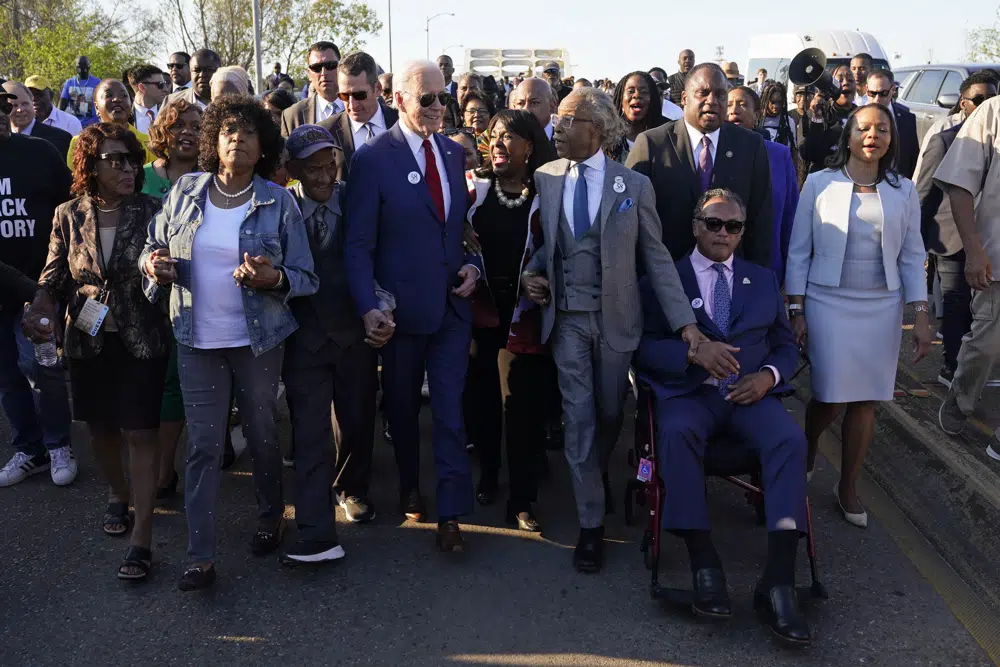
President Joe Biden used the searing memories of Selma’s “Bloody Sunday” to recommit to a cornerstone of democracy, lionizing a seminal moment from the civil rights movement at a time when he has been unable to push enhanced voting protections through Congress, and a conservative Supreme Court has undermined a landmark voting law. “Selma is a reckoning. The right to vote … to have your vote counted is the threshold of democracy and liberty. With it anything’s possible,” Biden told a crowd of several thousand people seated on one side of the historic Edmund Pettus Bridge, named for a reputed Ku Klux Klan leader. “This fundamental right remains under assault. The conservative Supreme Court has gutted the Voting Rights Act over the years. Since the 2020 election, a wave of states and dozens and dozens of anti-voting laws fueled by the ‘Big Lie’ and the election deniers now elected to office,” he said. As a candidate in 2020, Biden promised to pursue sweeping legislation to bolster protection of voting rights. Two years ago, his 2021 legislation, named after civil rights leader John Lewis, the late Georgia congressman, included provisions to restrict partisan gerrymandering of congressional districts, strike down hurdles to voting and bring transparency to a campaign finance system that allows wealthy donors to bankroll political causes anonymously. It passed the then-Democratic-controlled House, but it failed to draw the 60 votes needed to advance in a Senate under control by Biden’s party. With Republicans now running the House, passage of such legislation is highly unlikely. “We know we must get the votes in Congress,” Biden said, but there seems no viable path right now. The visit to Selma was a chance for Biden to speak directly to the current generation of civil rights activists. Many feel let down because of the lack of progress on voting rights, and they are eager to see his administration keep the issue in the spotlight. Few moments have had as lasting importance to the civil rights movement as what happened on March 7, 1965, in Selma and in the weeks that followed. Some 600 peaceful demonstrators led by Lewis and fellow activist Hosea Williams had gathered that day, just weeks after the fatal shooting of a young Black man, Jimmie Lee Jackson, by an Alabama trooper. Lewis and the others were brutally beaten by Alabama troopers and sheriff’s deputies as they tried to cross the Edmund Pettus Bridge at the start of what was supposed to be a 54-mile walk to the state Capitol in Montgomery as part of a larger effort to register Black voters in the South. “On this bridge, blood was given to help redeem the soul of America,” Biden said. The images of the police violence sparked outrage across the country. Days later, civil rights leader Martin Luther King Jr. led what became known as the “Turnaround Tuesday” march, in which marchers approached a wall of police at the bridge and prayed before turning back. President Lyndon B. Johnson introduced the Voting Rights Act of 1965 eight days after “Bloody Sunday,” calling Selma one of those rare moments in American history where “history and fate meet at a single time.” On March 21, King began a third march, under federal protection, that grew by thousands by the time they arrived at the state Capitol. Five months later, Johnson signed the bill into law. This year’s commemoration came as the historic city of roughly 18,000 was still digging out from the aftermath of a January EF-2 tornado that destroyed or damaged thousands of properties in and around Selma. The scars of that storm were still evident Sunday. Blocks from the stage where Biden spoke, houses sat crumbled or without roofs. Orange spray paint marked buildings beyond salvage with instructions to “tear down.” “We remain Selma strong,” Mayor James Perkins said, adding that “we will build back better.” He thanked Biden for approving a disaster declaration that helped the small city with the cost of debris cleanup and removal. ADVERTISEMENT Before Biden’s visit, the Rev. William Barber II, a co-chair of Poor People’s Campaign, and six other activists wrote Biden and members of Congress to express their frustration with the lack of progress on voting rights legislation. They urged Washington politicians visiting Selma not to sully the memories of Lewis and Williams and other civil rights activists with empty platitudes. “We’re saying to President Biden, let’s frame this to America as a moral issue, and let’s show how it effects everybody,” Barber said in an interview. Among those sharing the stage with Biden before the march across the bridge were Barber, the Rev. Jesse Jackson, Martin Luther King III, and the Rev. Al Sharpton. On the bridge crossing, marchers sang “This Little Light of Mine” and “We Shall Overcome,” and, following tradition, once they reached the point where Lewis and others were told in 1958 that they were on an unlawful march, they stopped and prayed. Water bottles were passed out to some who had gathered to hear Biden, and at least one person was taken away on a stretcher because of the upper-70s heat. Some had waited hours in the sun before relief came from shadows cast by nearby buildings. Delores Gresham, 65, a retired healthcare worker from Birmingham, arrived four hours early, grabbing a front-row spot so her grandchildren could hear the president and see the commemoration. “I want them to know what happened here,” she said. In his remarks, Biden said, “Everyone should know the truth of Selma.” And the president took a veiled dig at a high-profile Republican, Florida Gov. Ron DeSantis, when he said: “We should learn everything. The good, the bad, the truth, who we are as a nation.” DeSantis’ administration has blocked a new Advanced Placement course on African American studies from being taught in high schools, saying it violates state law and is historically inaccurate. Last year, he signed legislation that restricts certain race-based conversations and analysis in schools and businesses. More recently, his budget office called on state colleges to submit spending information on programs related to diversity, equity and inclusion, and critical
Joe Biden headed to Selma to commemorate Bloody Sunday
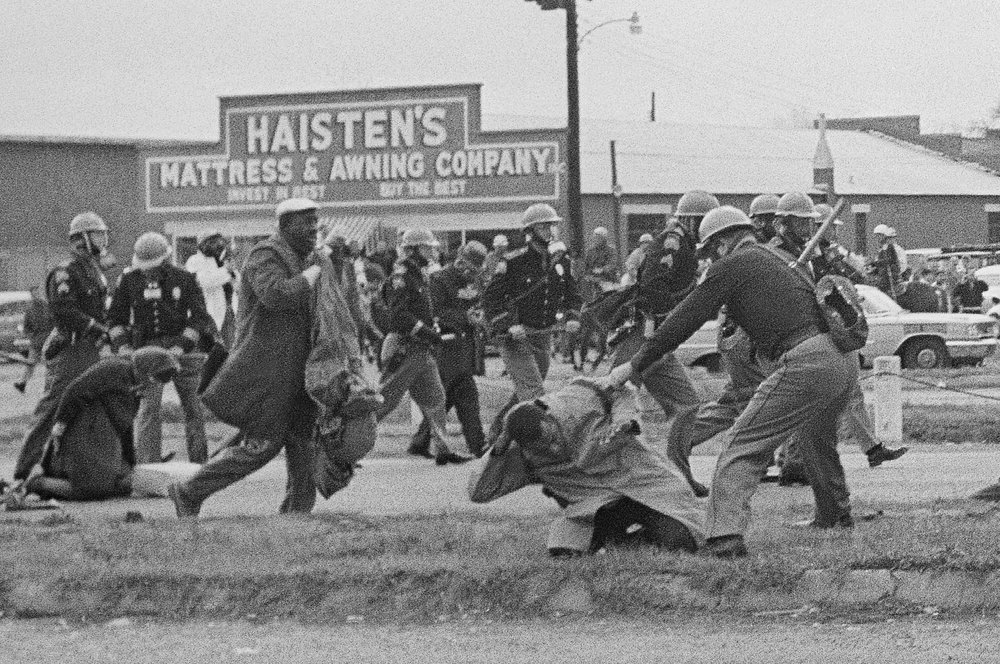
On Tuesday, Congresswoman Terri Sewell announced that President Joe Biden will join her in Selma on March 5 to commemorate the 58th Anniversary of Bloody Sunday, where voting rights marchers were beaten by Alabama State Troopers to prevent them from marching to Montgomery. Bloody Sunday proved to be a turning point in the civil rights movement that led to the passage of the Voting Rights Act of 1965. Rep. Sewell invited President Biden to visit Selma during his 2023 State of the Union Address. The visit comes after President Biden granted Rep. Sewell and the Alabama legislative delegation’s request to increase the federal cost share for FEMA’s public assistance program—including funding for debris removal and emergency protective measures—from 75% to 100% following the January 12th storms. “I am thrilled that President Biden has accepted my invitation to visit Selma for the 58th anniversary of Bloody Sunday,” said Rep. Sewell. “As Selma continues to recover from the January 12th storms, President Biden’s presence will send a clear message that our community is not alone and shows that the federal government will continue to be a partner in rebuilding Selma and Dallas County. I look forward to welcoming the President to my hometown as we reflect on the sacrifices of the Foot Soldiers in the name of equality and justice for all.” Sewell is a native of Selma and the first Black woman to represent Alabama in the United States Congress. “On Sunday, March 7, 1965, time stopped and blood spilled as brave and righteous Americans sought to cross a bridge named after a Klansman in Selma, Alabama, to reach the other side of justice,” Biden said in a statement last year. “Led by the late John Lewis, they marched to secure their sacred right to vote. Their heroism was met by batons and tear gas. They were beaten, but not defeated. Their absolute courage forced America to look in the mirror and Congress to act. Soon after, President [Lyndon] Johnson signed the Voting Rights Act of 1965.” “In Selma, the blood of John Lewis and so many other courageous Americans sanctified a noble struggle,” said Biden. “We are determined to honor that legacy by passing legislation to protect the right to vote and uphold the integrity of our elections, including the John Lewis Voting Rights Advancement Act and the Freedom to Vote Act.” Biden previously attended the Bloody Sunday Commemoration just ahead of the 2020 Democratic Presidential primary. Sewell’s endorsement, combined with Biden’s personal campaigning at the annual commemoration event, helped Biden win the Alabama Democratic Presidential Primary and effectively propelled the former Vice President to the Democratic nomination for the Presidency. While the voting rights marchers were ultimately victorious in their struggle for equality, Selma itself has been in severe decline since the 1960s. According to the Census Bureau just 17,625 persons lived in Selma in 2022 -down from 23,720 in 1990 – a 25.7% decrease. In 2022, just 50.1% of Selma residents 16 years and older are in the workforce, and per capita income is just $19,262. The closing of Craig Air Force Base in 1977 was a shock to Selma’s economy that it never was able to overcome. To connect with the author of this story or to comment, email brandonmreporter@gmail.com.
U.S. Supreme Court hears oral arguments on case challenging Alabama redistricting
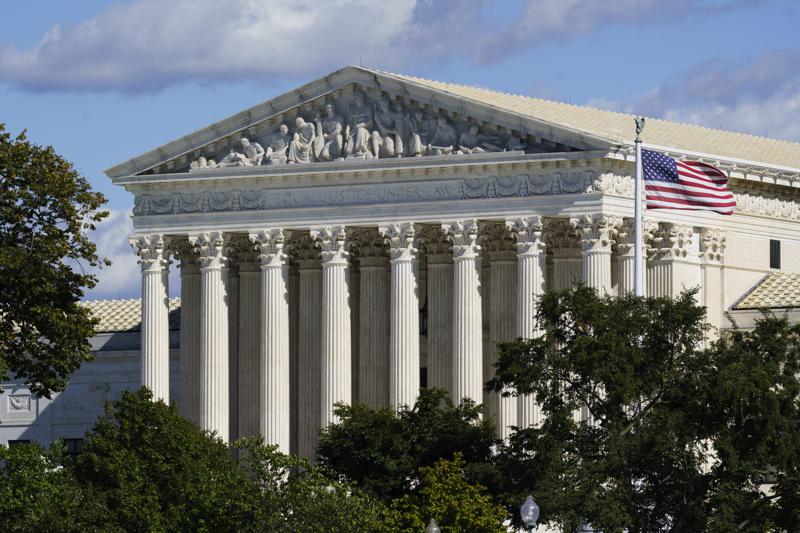
On Tuesday morning, the U.S. Supreme Court heard the case of Merrill versus Milligan. The case will decide whether or not Alabama’s redrawn congressional map violates Section 2 of the Voting Rights Act of 1965 (VRA). Evan Milligan, the Director of Alabama Forward, sued in federal court, claiming that the 2021 redistricting congressional map prepared and passed by the Alabama Legislature dilutes the voting power of African Americans in the state. In Alabama, African Americans make up over 27% of the eligible voters, but six of the seven Congressional districts are majority White. Congresswoman Terri Sewell is the only African American in Alabama’s Congressional Delegation and is the only Democrat to hold any office higher than State Senator in the state of Alabama. She attended today’s oral arguments. “We in Alabama are no strangers to the fight for fair representation,” said Rep. Sewell. “After all, it was in Selma—almost six decades ago—where John Lewis and so many Foot Soldiers shed blood on a bridge for the equal right of all Americans to vote. But today, we know that old battles have become new again. As the Voting Rights Act of 1965 remains on life-support, states across the nation are racing to restrict voting access to dilute our power and erase our progress. Today, they are taking aim at one of the last remaining provisions of the VRA, Section 2.” “Fair representation matters,” continued Sewell. “I urge our Justices to do what is right and uphold the protections that our foremothers and forefathers fought so hard to secure. I also urge the Senate to do its job and pass the John R. Lewis Voting Rights Advancement Act to restore the full power of the VRA.” In 2013 Sewell attended the oral arguments of the Supreme Court’s Shelby v. Holder case which Shelby County challenged Section 4 of the Voting Rights Act, claiming that the section which required that the state get preclearance for any voting changes, including redistricting, was obsolete. The conservative majority of the Supreme Court agreed with Shelby County and the City of Calera and invalidated Section 4. The result of that decision meant that the Biden Justice Department did not have to give preclearance to the 2021 redistricting and other voting law changes that have occurred since Shelby v. Holder. Milligan and his attorneys claim that the six majority to 1 majority-minority split by the legislature (which mirrors the 2010 redistricting that was approved by the Obama Justice Department) is a violation of Section 2. Milligan and Alabama Forward argued that the state should have two Black-majority districts. John Merrill is Alabama’s Secretary of State and, as such, is tasked with being the state’s top election official. A lower court panel of three judges agreed with Milligan, but the State of Alabama appealed to the Supreme Court, resulting in a stay of the lower court decision. The state has argued that the only way to create two majority-Black districts would be to focus solely on race, which the state argues the Supreme Court has already directed them not to do. The state has also argued that such a map would unnecessarily disturb communities of interest, such as putting Baldwin and Mobile, Alabama’s two coastal counties a consideration, in different districts. The court could affirm that the Alabama Legislature got it right, or the court could order a new map to be drawn. It would be up to the court whether that new map would be drawn by the Legislature or by the court itself. Alabama Today has obtained four alternative maps that have been drawn, creating either creating two majority-minority districts or, failing that, two districts that would likely be won by a minority, including one that does not divide counties. To connect with the author of this story, or to comment, email brandonmreporter@gmail.com.
Historic marker at boyhood home of late U.S. Rep. John Lewis
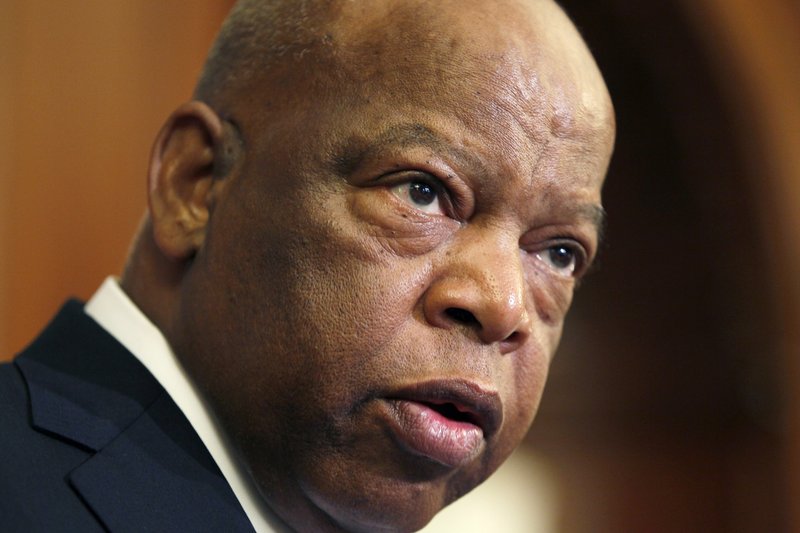
There’s now a historic marker at the one-story brick house in Alabama where the late civil rights leader and Georgia Congressman John Lewis grew up as one of 11 children. The marker for Lewis’ birthplace was unveiled Saturday in Troy, WSFA-TV reported. Lewis’ family said at the ceremony that they believe it’s their duty to carry his legacy and continue making what they call “good trouble.” “When we see something that is not right, not fair, not just — we have a moral obligation to speak up and speak out,” said nephew Jerrick Lewis. The family created the John R. Lewis Legacy Institute to support civil rights education and engage in social justice, education equality, and health awareness. Troy Mayor Jason Reeves said the house, now a historic landmark, will become part of the story of the civil rights movement in Alabama, starting with his birthplace and ending in Montgomery. “The fact that that he is the ‘Boy from Troy’ and is known all over the world for all that he accomplished, this a great sense of pride for us,” Reeves said. Lewis, born on Feb. 21, 1940, grew up on his family’s farm and attended segregated public schools. In 1965, on a day that became known as “Bloody Sunday,” he led marchers onto the Edmund Pettus Bridge in Selma, where state troopers ordered them to disperse, then attacked them. Lewis was elected to the Atlanta City Council in 1981 and to Congress in 1986. His younger sister, Ethel Lewis-Tyner, told WSFA she never thought “in a million years” their home would be a part of history.
George Wallace Jr.: 50th anniversary of George Wallace assassination attempt offers opportunity for reflection
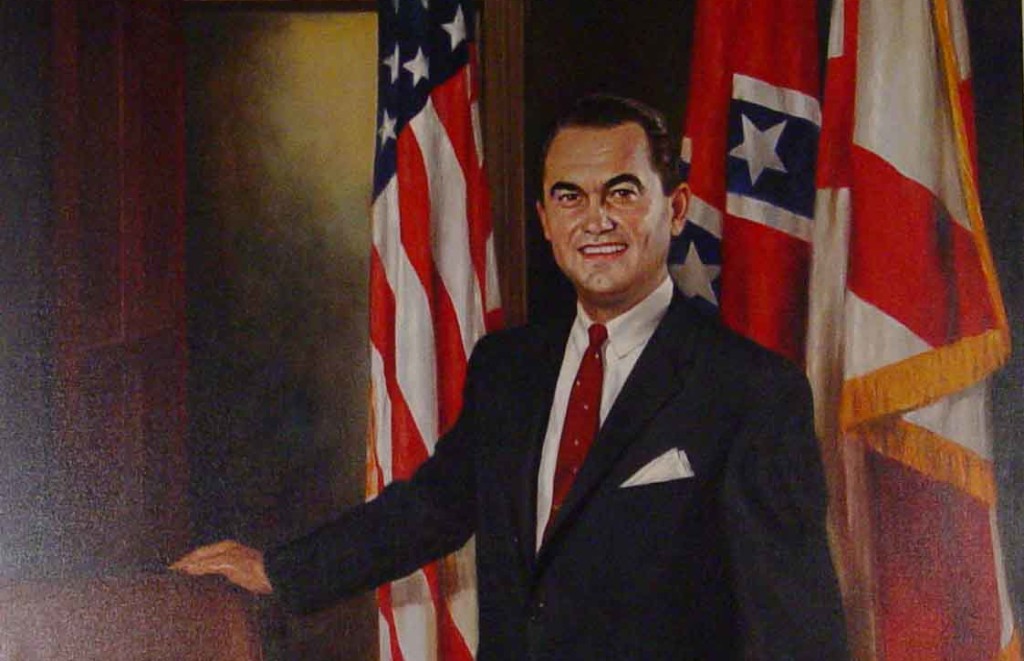
Fifty years ago, on May 15, 1972, I was a student at the University of Alabama and in my Tuscaloosa apartment when a “Special Report” on the television announced that my father, Gov. George C. Wallace, had been shot and critically injured in an assassination attempt on his life. The frontrunner for the Democratic presidential nomination at the time, Dad had been campaigning in Maryland on the eve of that state’s primary. The Michigan primary was scheduled for the next day, as well, and polling predicted that my father would carry both states by wide margins. It was at a parking lot rally in Laurel, Maryland where Arthur Bremer, a troubled, 21-year-old busboy from Milwaukee, took five fateful shots and wounded my father in the chest and abdomen as he was shaking hands in the crowd. Dad later told me that he was immediately aware his injuries were serious, and when he hit the ground, he purposely turned his head, closed his eyes, and pretended to be dead in hopes that a possible second gunman would choose not to shoot. Despite the chaos surrounding him, he had felt a certain peace and finality come over him as he wrongly assumed his wounds would be fatal. A Secret Service agent had kneeled over him in a protective position, but his drawn gun was dangerously close to Dad’s head. “I wish you wouldn’t point that at me – I have been shot enough for one day,” he told the agent. Bremer’s flurry of gunfire had also resulted in Secret Service agent Nick Zarvos being shot in the neck, Alabama State Trooper E.C. Dothard, a member of the gubernatorial security detail, receiving a graze to the stomach, and Dora Thompson, a campaign volunteer from Hyattsville, Maryland, suffering a knee wound after a bullet ricocheted off of the asphalt. A diary that Bremer kept for months stated his intention to “do something bold and dramatic” and indicated he had originally intended to assassinate President Richard Nixon. Stalking the president on his various travels, Bremer got close enough to take a shot at an economic summit in Ottawa, Canada, but the strong Secret Service presence surrounding the chief executive prompted him to change plans and target my father – the most likely future president – instead. Within minutes of receiving the news, state troopers arrived at my apartment door, whisked me to the airport, and placed me aboard a private jet along with Charlie Snider, the national chairman of the Wallace presidential campaign, press secretary Billy Joe Camp, and a handful of others. We soon arrived at Holy Cross Hospital, where my father had been taken by ambulance and was undergoing five hours of emergency surgery. The attending doctors told us that his already grave injuries were complicated by the fact that just prior to the rally, Dad and his traveling campaign staff had stopped at a Howard Johnson’s restaurant, where he ate his usual lunch of hamburger steak and fries doused in ketchup. The bullets had caused the undigested food to explode within his abdomen, and the lingering peritonitis blood infection and abscesses that followed would almost claim his life. When I walked into the recovery room, my father was still heavily sedated and many of the stitches on his chest and stomach were visible. He reached out with a look I had never seen – one of a man who had been to death’s door and was back among the living, reunited with his family. I have never forgotten that look. It soon became clear that the injuries had paralyzed my father from the waist down, and though we held hope that he would eventually regain use of his legs, those particular prayers were left unanswered. He remained hospitalized at Holy Cross for several weeks as he fought infections and held the continuing specter of death at bay. Once he regained strength, he received visits from notable leaders that included President Nixon, Senator George McGovern, Congresswoman Shirley Chisholm, and Ethel Kennedy, whose husband, Robert Kennedy, had been killed while campaigning for the presidency in 1968. Cards, letters, telegrams, and flowers flowed into the hospital by the thousands. Upon his release, Dad flew to Miami on a military medical aircraft, which was provided by President Nixon, to appear at the 1972 Democratic National Convention, where McGovern, a committed liberal, would claim the nomination. My father’s forced absence from the campaign trail had allowed his competitor to secure the required delegates. During his convention remarks, Dad warned the Democrats that embracing the extreme left and its ultra-liberal agenda would cost the party the support of the rank-and-file, blue-collar, middle-class families that served as its foundation and doom it to lose the Deep South states in future elections. Like a clairvoyant with a crystal ball, all of the predictions he made those years ago have come true today. As my father spoke, a handful of liberal delegates tried to shout him down, and some marched around the convention hall wearing paper masks depicting Arthur Bremer, which Wallace supporters ripped from their faces. The vast majority, though, gave him a warm reception and appreciated the history of the moment. His mission complete, it was time to return to his beloved Alabama. My father would serve two more terms as governor and run for president a fourth time in 1976, though he lost the nomination to Jimmy Carter, a former Georgia governor who had once been a Wallace supporter. Retirement from public office in 1987 would offer him the opportunity for reflection in his later years, and his relationship with God grew significantly. One of the most enduring and revealing testaments to my father’s deepening faith came in an incredible letter of forgiveness he wrote with no fanfare or public announcement to his assailant, Arthur Bremer, in 1995. A copy of the missive was discovered tucked away in Dad’s files years after it was written. “I love you and have forgiven you, and if you will ask Jesus Christ into your heart,
Alabama church of ‘Bloody Sunday’ on endangered places list
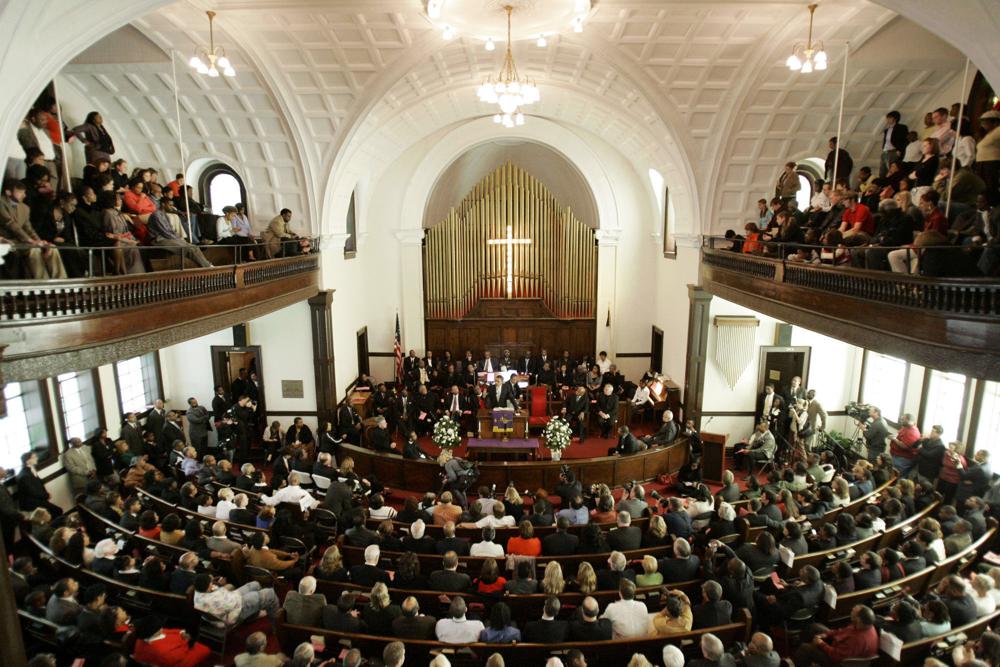
Like religious congregants all over, the people of historic Brown Chapel AME Church turned off the lights and locked the doors at the beginning of the COVID-19 pandemic because it wasn’t safe to gather for worship with a deadly virus circulating. For a time, the landmark church that launched a national voting rights movement in Selma, Alabama, was off-limits. What members found when they returned was heartbreaking: Termites had eaten so much wood that parts of the structure weren’t stable anymore, said member Juanda Maxwell, and water leaks damaged walls. Mold was growing in parts of the building, where hundreds met before Alabama state troopers attacked voting rights demonstrators on Bloody Sunday in 1965 at the Edmund Pettus Bridge. “It’s in horrible shape,” said Maxwell. “It’s a tough time. Because we were closed for a year, it exacerbated the problem with water coming in.” The red brick church, with distinctive twin bell towers and a domed ceiling, tops this year’s list of the nation’s most endangered historic places, according to the Washington, D.C.-based National Trust for Historic Preservation, a nonprofit organization which works to highlight and preserve sites that are in danger of being lost. Other places on the list include: — Chicano/a Murals painted on the sides of buildings in Colorado and inspired by the human rights and cultural movements of the 1960s and ’70s. — The Deborah Chapel, a Jewish mortuary building established in 1886 in Hartford, Connecticut. — Francisco Sanchez Elementary School, the closed centerpiece of the town in Umatac, Guam. — Minidoka National Historic Site, where more than 13,000 Japanese Americans were incarcerated during World War II in Jerome, Idaho. — Camp Naco, a base for Black Buffalo Soldiers dating back to 1919 along the U.S.-Mexican border in Naco, Arizona. — Picture Cave in Warrenton, Missouri, which holds indigenous artwork dating as far back more than 1,200 years by the Osage Nation. — Brooks Park Art and Nature Center, the home and art studio in East Hampton, New York, of James Brooks and Charlotte Park, who were important in the abstract expressionism movement in American art. — Palmer Memorial Institute, a boarding school built in 1902 for Black youths in Greensboro, North Carolina. — Olivewood Cemetery, an African American burial ground in Houston, Texas, dating to 1875 and containing more than 4,000 graves. — Jamestown, the site in Jamestown, Virginia, where enslaved people first arrived in America and where the first publicly elected assembly in the United States met. Brown Chapel, the first African Methodist Episcopal church in Alabama, was the site of preparations for a voting rights march from Selma to Montgomery on March 7, 1965, when police beat marchers led by the late Rep. John Lewis, then a young activist. Weeks later, thousands gathered there before the Selma-to-Montgomery march led by the Rev. Martin Luther King Jr. Maxwell is part of a group of Brown Chapel members serving on a foundation that’s trying to raise money for repairs estimated to exceed $4 million, she said. The church, located in a public housing community, has only a few dozen members in regular attendance, so it’s relying on grants and outside donations to fund the work. The National Park Service already has provided a grant of $1.3 million for the restoration of the church, which was constructed in 1908 by a formerly enslaved Black builder, A.J. Farley, and declared a National Historic Landmark in 1997. “Our goal is to try to receive over $3 million in grants to do the foundational work. After that we hope to get in more private donations,” Maxwell said. With members unable to gather in the building since repair work began in October, Maxwell said, the few who still attend continue meeting online. “We’re Zooming. The pastor is searching for a place,” she said. Republished with the permission of the Associated Press.
Plan advances to alter name of Edmund Pettus Bridge
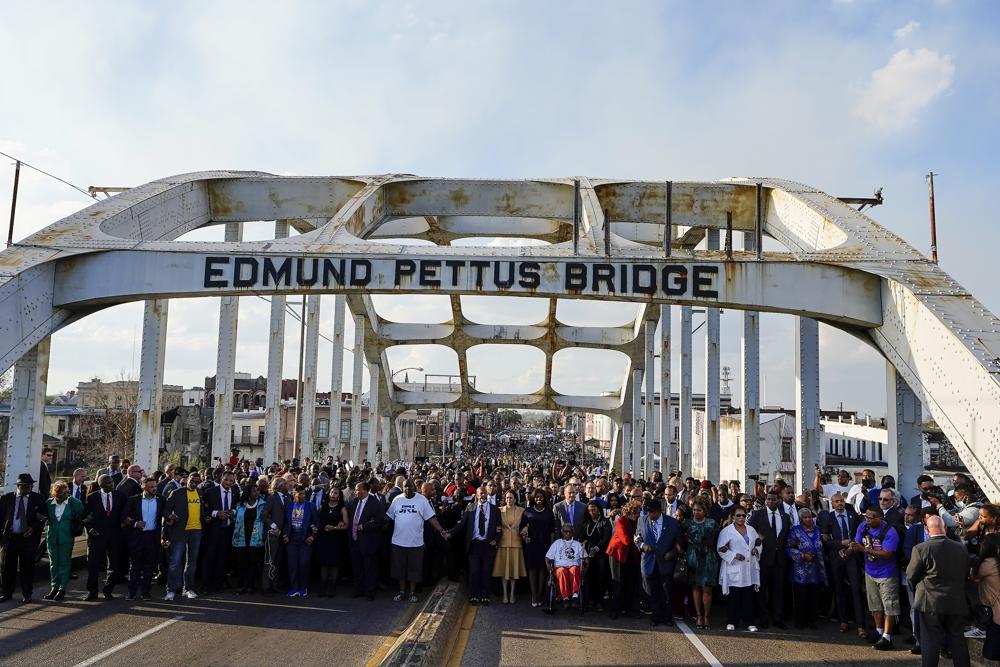
Alabama lawmakers on Tuesday advanced legislation that would alter the name of Selma’s Edmund Pettus Bridge to honor those who were beaten on the bridge as they marched for civil rights in 1965. The Alabama Senate voted 23-3 for legislation that would change the official name to the “Edmund W. Pettus-Foot Soldiers Bridge.” However, the lettering on the famous bridge would remain unaltered. The name “Foot Soldiers” would be on a separate sign that would include a silhouette of the marchers. The bill dubbed the “Healing History Act,” now moves to the Alabama House of Representatives with three meeting days remaining in the legislative session. The bridge in 1940 was named after Pettus, a Confederate general and reputed Ku Klux Klan leader. However, 25 years later, it became an enduring symbol of the civil rights movement after marchers were beaten by law enforcement officers on the bridge in 1965. The melee became known as Bloody Sunday and helped lead to passage of the Voting Rights Act of 1965. “Not a single letter would be touched. It would stay intact in its historical context. And at the same time… honor the history that is there and the history that came out of it,” said state Sen. Malika Sanders-Fortier, a Democrat from Selma. Through the years, some have proposed changing the name of the bridge, including a push to name it for the late U.S. Rep. John Lewis. The Georgia congressman was one of the demonstrators beaten on the bridge in 1965. Sanders-Fortier said many who marched for civil rights in her community do not want the bridge name changed entirely because of what the bridge has come to represent. State Sen. Gerald Allen, the author of a state law forbidding the removal and renaming of longstanding monuments and memorials, voted against the name alteration. The Alabama Memorial Preservation Act was approved as some cities began taking down Confederate monuments and emblems. Allen said the name of the Edmund Pettus Bridge is famous across the world. “If you add to it, you change it,” Allen said. The bill also would steer funds to provide for the commissioning and protection of new monuments and the preservation of sites that have significance to Alabama history. Sanders-Fortier said it is important to honor all of the state’s history and “to heal from our past so we can move forward as a state.” “Many of the events in our state’s history have been traumatizing, been traumatizing to African-American folk to Indigenous folk to white folk,” she said, adding that healing means considering the “hurt of each group.” Republished with the permission of the Associated Press.


